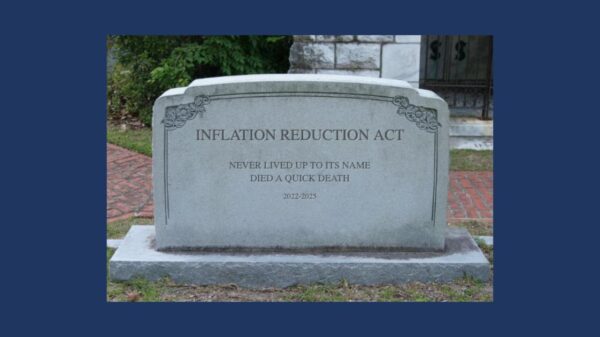The Biden administration’s regulatory onslaught is no mere rumor. It’s a harsh reality deeply problematic for the rule of law, for the concept of self-government, for the institutions of our constitutional republic, and for federalism. And, not least, for a U.S. economy subjected to ever-increasing legal burdens, bureaucratic interference, distortions in the productivity of resource use, and metastasizing Beltway mindlessness.
But it’s a full-employment act for lawyers, for aspiring bureaucrats, and for, well, guys like me tasked with reviewing and analyzing the massive flow of paper (that is the polite term) produced by the regulatory agencies. My inbox never shrinks, notwithstanding long hours and the production of ever-more-critical comment papers and the like. And so I am always playing catch-up, the latest example of which is my very tardy examination of the International Energy Agency’s “net-zero roadmap,” detailed in two recent reports.
The IEA roadmap is little more than a propaganda exercise driven by wishful thinking and determination to ignore economic, scientific, and engineering realities. The IEA’s arguments have been eviscerated by the Energy Policy Research Foundation, whose recent analysis in coordination with the RealClear Foundation I cannot improve upon.
An interesting extension of the EPRF analysis is the degree to which the IEA and the congressional opponents of fossil fuels share a vision. In the words of the IEA the net-zero roadmap means that:
No new oil and natural gas fields are required beyond those already approved for development. Supply is increasingly concentrated in a few major producing countries.
Once fields under development start production, all upstream oil and gas investment is spent on maintaining production at existing fields.
Note that “production at existing fields” inexorably will decline. So the net-zero roadmap means no investment in new fossil fuel production fields, an increasing cartelization of the supply side of the market, and, inevitably, worldwide output declining toward zero. Obviously, the market value of much of the capital stock complementary with fossil fuels also will decline toward zero. It will be “stranded.”
Let us compare that outlook with the arguments promoted by Senator Sheldon Whitehouse (D-RI), a prominent opponent of the fossil-fuel industry. At a committee hearing on March 29 titled “Left Holding the Bag: The Cost of Oil Dependence in a Low-Carbon World,” Whitehouse argued, “The operative term of today’s hearing: stranded assets. The prospect of investments in fossil fuels becoming worthless when there is no one to buy the dirty product may sound like a far-off possibility, but for the United States, the world’s largest producer of oil and gas, it could be just around the corner.”
Like the IEA, Whitehouse is assuming a “transition” to a “low-carbon” energy sector that is virtually certain not to be observed. Because fossil fuels are overwhelmingly the most efficient forms of energy available now or prospectively — as the EPRF analysis and actual market behavior demonstrate — market forces will not engender a massive shift away from them toward such uncompetitive and unreliable forms of energy as wind and solar power. It is only large subsidies, both direct and indirect, and other policy-driven subventions that allow such energy forms to survive.
Accordingly, market forces will not yield a “stranding” of the relevant respective components of the capital stock. Moreover, any such market shift would take place over many years or decades as part of the long-term process of capital depreciation, investment, and changes in resource allocation.
Nor will government policies engender such a massive economic transformation, however strenuous the efforts of politicians, bureaucrats, and interest groups to force such an outcome. With the exception of the methane tax included in the Inflation Reduction Act, Congress has never enacted a statute mandating direct reductions in greenhouse gas (GHG) emissions, for the obvious reason that large reductions in such emissions cannot be achieved without sharp declines in the consumption of fossil fuels — and a large increase in energy costs. The IPCC in a recent report argues that achievement of the purported 1.5°C “safe” limit on global temperature increases would require implicit taxes equivalent to over $35 per gallon of gasoline by 2030 (section 2.5.2.1), in constant year 2022 dollars, and rising sharply thereafter.
Congress will never enact such policies.
This is true as well at the international level. The Paris agreement, apart from the reality that its Nationally Determined Contributions (that is, promised emissions cuts) are meaningless, necessarily contains no enforcement mechanism, and no such international agreement even conceptually consistent with the most basic tenets of national sovereignty could do so.
Government policies to reduce GHG emissions would have future climate effects either trivial or indistinguishable from zeroEditSign, as predicted by the EPA climate model under a set of assumptions that exaggerate the prospective impacts of such emissions reductions. Net-zero U.S. GHG emissions effective immediately would yield a reduction in global temperatures of 0.173°C by 2100. That effect would be barely detectable given the standard deviation (about 0.11°C) of the surface temperature record. The entire Paris agreement: about 0.178°C. A 50 percent reduction in Chinese GHG emissions: 0.184°C. Net-zero emissions by the entire Organization for Economic Cooperation and Development: 0.352°C. A global 50 percent reduction in GHG emissions implemented immediately and maintained strictly would reduce global temperatures in 2100 by 0.687°C. Note that GHG emissions in 2020 fell by about 3.7 percent as a result of the COVID-19 economic downturn. Can anyone believe that even larger GHG reductions — and the attendant economic costs — are plausible politically?
In short, such policies, whether domestic or international, cannot satisfy any plausible benefit/cost test. Nonetheless, the beat goes on, in Europe and in the Beltway. But reality will intrude, sooner or later.
Benjamin Zycher is a senior fellow at the American Enterprise Institute. This article was originally published by RealClearEnergy and made available via RealClearWire.



















